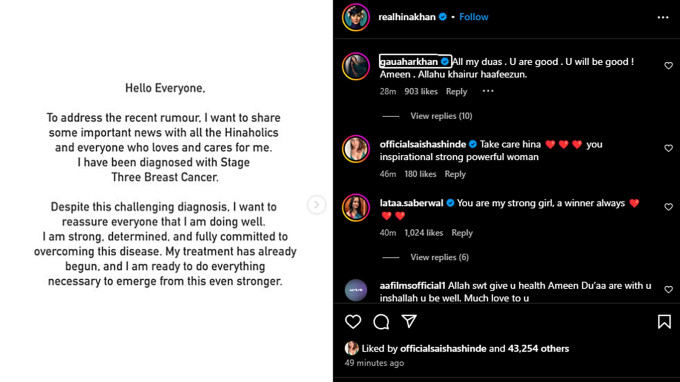As Hina Khan opens up about breast cancer diagnosis, we ask expert what ‘stage 3’ means
Popular television actor Hina Khan revealed that she has been diagnosed with stage three breast cancer. In a heartfelt social media post, the 36-year-old star reassured fans that she is undergoing treatment and remains determined to overcome the challenge.
Hina’s message addressed to her fans (“Hinaholics”) and well-wishers, conveyed strength and positivity. She wrote, “Despite this challenging diagnosis, I want to reassure everyone that I am doing well… My treatment has already begun, and I am ready to do everything necessary to emerge from this even stronger.”

She also requested privacy while navigating this journey, but expressed appreciation for support and encouragement.
Hina Khan is a household name in Indian television. She rose to fame with her portrayal of Akshara in the long-running soap opera “Yeh Rishta Kya Kehlata Hai,” and by participating in reality shows like “Bigg Boss” and “Khatron Ke Khiladi.”
View this post on Instagram
A post shared by 𝑯𝒊𝒏𝒂 𝑲𝒉𝒂𝒏 (@realhinakhan)
Breast cancer is an uncontrolled growth of abnormal cells in the breast tissue. It’s the most common cancer affecting women globally, though it can also occur in men. Hina’s diagnosis serves as a powerful reminder of the importance of breast cancer awareness, early detection, and staying positive during treatment.
A breast cancer diagnosis can be life-altering, and the stage of the cancer significantly influences the treatment course and outlook. Stage 3 breast cancer falls under the umbrella of “locally advanced” breast cancer, meaning the cancer has spread beyond the initial tumour but hasn’t reached distant organs yet. While this diagnosis can be daunting, many women with stage 3 breast cancer respond well to treatment and can live long, healthy lives.
What does a stage 3 diagnosis mean?
According to Dr Niti Raizada, Senior Director – Medical Oncology and Hemato Oncology, Fortis Hospitals, Bengaluru, in a stage 3 breast cancer diagnosis, the tumour is larger than 5 cm (about the size of a small lime) and has spread to 1-3 lymph nodes (pea-sized glands in the armpit/ lymph nodes in neck or internal mammary area) or surrounding tissues like chest wall muscles or skin.
This can cause changes in breast appearance, lumps, and discomfort, she said.
It’s important to note that stage 3 is further divided into categories (3A, 3B, and 3C) depending on the specific extent of lymph node involvement and other factors.
 Khan’s post received an outpouring of support from fellow celebrities and her fans (Source: Hina Khan/ Instagram)
Khan’s post received an outpouring of support from fellow celebrities and her fans (Source: Hina Khan/ Instagram)
Why might stage 3 breast cancer go undiagnosed? What are the risk factors?
Early-stage tumours might be very small and not cause noticeable symptoms, said Dr Raizada. Regular self-exams and mammograms are crucial for detection as they can identify lumps before they’re felt, she added.
Risk factors for breast cancer include age, family history, genetics, and lifestyle choices, according to Dr Raizada. “Some women are more susceptible due to inherited gene mutations (BRCA1,BRCA2, PALB2 etc) that significantly increase the risk,” she told indianexpress.com
Several factors can contribute to a delayed diagnosis:
Lack of Symptoms: Early-stage breast cancer often doesn’t present with noticeable symptoms. Regular self-examinations and mammograms are crucial for early detection.
Dense Breast Tissue: Dense breast tissue can make it harder to identify abnormalities on mammograms. Additional imaging tests like ultrasound or MRI may be necessary in these cases.
Age: Younger women are less likely to undergo routine mammograms, potentially leading to a later diagnosis.
Treatment options for stage 3 breast cancer
The treatment approach for stage 3 breast cancer is typically multifaceted and tailored to the individual’s specific case.
Stage 3 are locally advanced breast cancers and treated very differently, said Dr Raizada. “Treatment often is neoadjuvant chemotherapy if we plan to conserve breast. Also personalised treatment is done based on tumour characteristics like ER,PR, Her2neu. Radiation is often required,” she explained.
Early detection is key in fighting most cancers. Regular self-examinations and mammograms are crucial for women over 40. If you notice any changes in your breasts, don’t hesitate to consult a healthcare professional.
Disclaimer: The copyright of this article belongs to the original author. Reposting this article is solely for the purpose of information dissemination and does not constitute any investment advice. If there is any infringement, please contact us immediately. We will make corrections or deletions as necessary. Thank you.

